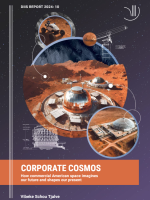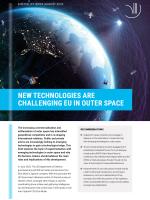Corporate Cosmos
In the blink of an eye, space has emerged as a crucial site of investment and competition: from the exploding market of commercial satellites that now make up a vital part of our global tracking, navigation, security, and communications networks, to a new ‘Golden Age’ of outer space exploration, where radical agendas of mineral mining, geo-engineering, and human space travel compete for attention and investment.
In this new ‘race for space’, one actor stands out: the American space industry. In less than a decade, the United States has developed a commercial space market like no other. Headed by the very same handful of American individuals and corporations that already have a near monopoly on owning, controlling, and designing global communication and information systems, and led by a new breed of CEO activists, who not only wield unparalleled private economic power, but novel forms of both cultural and social media influence too. In terms of money, in terms of technology monopolies, but more than anything, in terms of access to the framing and shaping of ideas, the commercial American space industry has become a force to be reckoned with.
This report thus asks a central, crucial question: what does the commercial American space industry want? In reply, it unpacks a sector driven not just by profit, but by two grand-scale visions of the future. A tech-optimist vision of space as a climate solution: a both profitable and sustainable way out of contemporary ecological dilemmas. And a radically libertarian vision of space as a place of political revolution: a realm free from the reach of states, and as such an arena in which the virtues of market innovation and the leadership of CEO activists might be displayed.
As the report concludes, commercial American space is not simply a neutral government instrument or partner, blindly loyal to the axioms of liberal democracy or regulatory global governance. Increasingly, it is an autonomous geopolitical actor, with a vision and agenda of its own. It is the aim of this report to equip both citizens, journalists, advisors, and decision-makers, with an understanding of why those visions might not simply spell green solutions and a new economic horizon, but could also:
- destabilize the cohesion and predictability of American (foreign) policy-making.
- deepen global divides and inequalities.
- weaken regulatory global institutions.
- divert attention from ecological problems on Earth, while giving rise to new ones in space.
- Land rights and investments
- Climate change and environment
- Oil, gas and minerals
- Defence and security policy
- Security challenges in the Baltic region
- Danish and European foreign policies
- EU External Relations
- World politics
- Diplomacy and international organisations
- Global economic governance
- Conflict and economy




